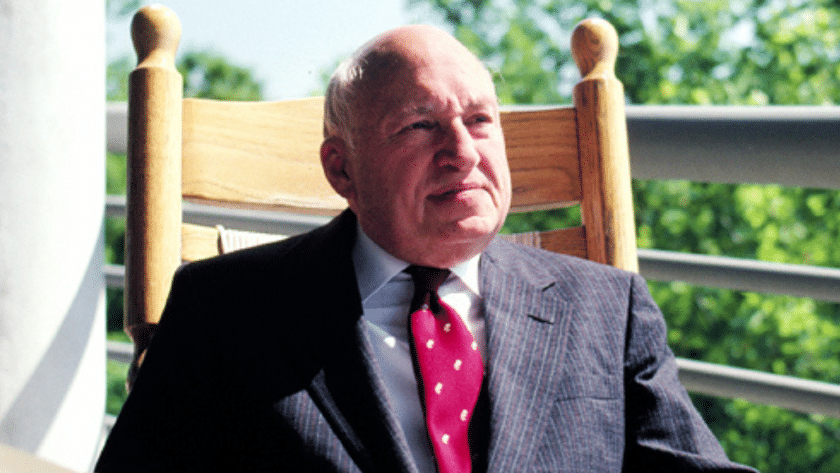
Chick-fil-A’s Founder Built the Franchise System With Faith-Based Principles
While Chick-fil-A founder Samuel Truett Cathy was growing up, the notion of becoming a billionaire franchisor was probably the furthest thing from his mind. He grew up in poverty and spent his free time helping his mother in the kitchen of the boarding house she ran. Little did he know that Chick-fil-A would become one of the largest quick-service chicken restaurant chains in the U.S. and a widely recognized great place to work. With stiff competition in the ‘Chicken Wars’ from McDonald’s, Wendy’s, Popeyes and other fast-food franchise brands, Chick-fil-A stands out with its friendly, quick service, quality food and amazing culture.
Here, we look into the legendary franchisor’s life, Christian faith and philanthropy as well as the Chick-fil-A’s founding and growth.
Cathy’s Early Life
Born in Eatonton, Ga., on March 14, 1921, Cathy was entrepreneurial from a young age, selling soft drinks in his front yard at 8 years old and later having an Atlanta Journal paper route, which he carried for seven years, according to The Atlanta Journal-Constitution. He and his brother, Ben Cathy, eventually became the breadwinners of the family as teenagers, making them grow up quickly.
Cathy was drafted into the U.S. Army at 18, where he served for six years and was honorably discharged. Upon returning home, Cathy and his brother decided to create something of their own. With the help of a $6,400 loan from a local bank, the brothers came up with the $10,600 they needed to open up a 24-hour diner, according to Mashed.
The Dwarf House

They opened the Dwarf Grill (later renamed the Dwarf House) in 1946 in Hapeville, Ga. Unlike the Chick-fil-A franchise we know today, the diner sold typical restaurant fare like burgers and steaks. In 1951, Cathy opened a second Dwarf House location in Forest Park, where he devised the formula for the Chick-fil-A sandwich.
Chick-fil-A Franchise’s Growth
The first Chick-fil-A restaurant opened in Atlanta’s Greenbriar Shopping Center in 1967. While standalone locations are now the norm for the Chick-fil-A franchise, it originally had mall locations and was a pioneer of the modern food court. Since its inception, the fast-food giant has expanded to nearly 3,000 locations across North America and Puerto Rico. While becoming a Chick-fil-A franchisee is competitive, franchise owners benefit from a people-centric culture and faith-based values, which can be credited to Cathy.
I see no conflict whatsoever between Christianity and good business practices. People say you can’t mix business with religion. I say there’s no other way.
Importance of Faith
Cathy was a member of the First Baptist Church and taught Sunday School there for more than 50 years. The Bible was his guidebook for life, which makes it unsurprising that all of the Chick-fil-A franchise’s locations are closed on Sundays. While this policy upsets some fans (a mall developer even tried to get it changed by offering a $5,000 donation to a church of Cathy’s choice), Cathy wanted one day a week for himself and Chick-fil-A employees to rest and pray. According to The Atlanta Journal-Constitution, Cathy’s business philosophy and faith are intertwined. “I see no conflict whatsoever between Christianity and good business practices. People say you can’t mix business with religion. I say there’s no other way,” he said.
But the fast-food franchise’s Christian views don’t go over with some, and the brand has been sued for discrimination against LGBTQIA+ individuals, non-Christians and those with opposing viewpoints. Despite the criticism, Cathy always stuck to his religious principles.
Love, Loss and Philanthropy
Cathy married his childhood sweetheart, Jeannette McNeil, on Sept. 19, 1948. The couple met at Atlanta’s West End Baptist Church when they were children. A year after they got married, tragedy struck. His brothers, Ben and Horace Cathy, were killed in a plane crash. In addition to suffering a major loss and becoming the sole proprietor of the Dwarf House, Cathy experienced a health crisis when he was diagnosed with colon cancer at 38, which he detailed in his memoir, Eat Mor Chikin: Inspire More People. Other books he authored include It’s Easier to Succeed Than to Fail, It’s Better to Build Boys Than Mend Men, and How Did You Do It, Truett?
On top of being famous for his popular fast-food restaurant, Cathy was known for his philanthropy. He and Jeannette established the WinShape Foundation in 1984, a nonprofit organization that sponsors scholarships, camps and foster care programs. It’s safe to say that any entrepreneur can learn from Cathy’s life and legacy.
A Family Business

Cathy passed away on Sept. 8, 2014, at 93 due to diabetic complications. According to Chick-fil-A’s website, he is survived by his sons Dan and Don Cathy; daughter Trudy Cathy White; and 12 grandchildren and 23 great-grandchildren. Cathy’s family has continued his tradition of leadership, with Dan being promoted as the second-ever Chick-fil-A CEO in 2013 and Andrew Cathy serving as the current CEO.
Photos: Chick-fil-A
Copyright © 2025 FranchiseWire. All rights reserved.






